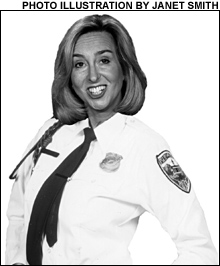 As she sets her sights on promotion, Kerry Healey has resurrected and even expanded her grandiose claims to criminal-justice expertise originally made during her 2002 campaign for lieutenant governor. Healey’s campaign Web site says that she “enjoyed a distinguished career as a law and public safety consultant.” In a press release issued this week, she claims to be a “criminologist and former consultant to the US Department of Justice in the 1990s” who “extensively researched domestic and gang-related violence.” In her campaign-announcement speech last month she said, “I worked for the US Department of Justice researching crime.” The state’s official Web site also says that she has authored four books on criminal justice.
As she sets her sights on promotion, Kerry Healey has resurrected and even expanded her grandiose claims to criminal-justice expertise originally made during her 2002 campaign for lieutenant governor. Healey’s campaign Web site says that she “enjoyed a distinguished career as a law and public safety consultant.” In a press release issued this week, she claims to be a “criminologist and former consultant to the US Department of Justice in the 1990s” who “extensively researched domestic and gang-related violence.” In her campaign-announcement speech last month she said, “I worked for the US Department of Justice researching crime.” The state’s official Web site also says that she has authored four books on criminal justice.
Those “books” are actually co-authored white papers of secondary research (pulling together previous work), written during her roughly 10-year stint as a part-time consultant for Cambridge-based Abt Associates, mostly under an Abt contract with a branch of the Justice Department. She was never a DoJ employee or consultant. She has no education or experience that qualifies her as a criminologist. And by no definition can her career be called distinguished — her reports are seldom cited, and she was never invited as a speaker or panelist in the field prior to becoming lieutenant governor. Even Abt executives have offered little praise for Healey.
Padding a résumé is not a disqualifying sin in politics. What matters is whether Healey, handed control of crime issues by a thoroughly disinterested governor, parlayed her self-proclaimed expertise into a public-safety agenda that has served the Commonwealth.
The results are mixed, at best. While she has implemented a few changes to the state’s badly broken criminal-justice system, she has mostly wasted her efforts scoring easy political points and fighting unnecessary battles. Meanwhile, on her watch, violent crime has swamped cities from Fall River to Springfield. No wonder she still talks about her work in the 1990s, and has little to say about what she’s done over the past three years.
While Rome Burns
In most of the state’s largest cities — Boston, Springfield, Brockton, New Bedford, Fall River, Lowell, Lynn, Quincy — violent-crime rates are higher than before Romney and Healey took office. In some cases, much higher. Springfield recently climbed to number 25 on an annual ranking of the most dangerous cities in America, and has had 50 homicides in the past three years, up from 30 in the previous three. Last year, Boston had its highest homicide tally in a decade. In Fall River, violent crime has doubled in five years.
Statewide, the number of gunshot-assault victims treated in hospital emergency rooms jumped 22 percent just last year, according to state figures, and are up a stunning 80 percent from 2000.
Healey was supposed to have done something about this. “Urban crime strategies” was one of the five topics she tackled in her first major undertaking as lieutenant governor, the Commission on Criminal Justice Innovation. But in the commission’s report, released in April 2004, this was the weakest section, as reported by the Phoenix at the time, filled with vague platitudes and material copied out of dated NIJ materials. (See “Crime Prevention,” April 9, 2004.)